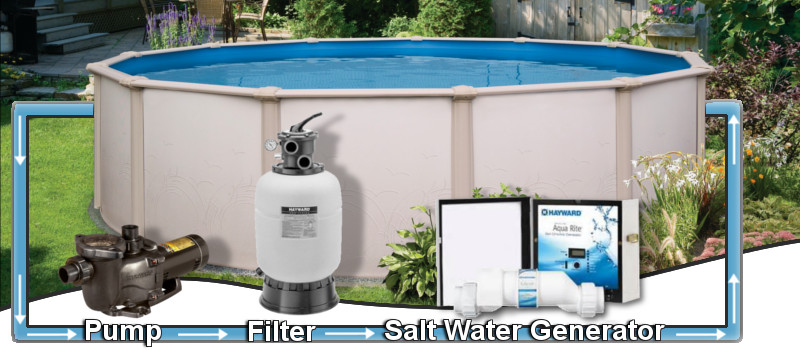If you are looking into getting a saltwater pool or converting your current pool into a saltwater pool, you are in the right place. Discover if a saltwater pool is right for you.
Less Salt Than The Ocean
It is commonly believed that saltwater swimming pools are extremely salty and similar to swimming in the ocean. However, this is not the case. The water in a saltwater pool does contain salt, but it is on a much smaller level than ocean water (35,000 parts per million). The pool water is actually much closer to the level of salt in human tears, which has only 3,200 ppm. This means that you can open your eyes underwater without worrying.
What is the Purpose of a Saltwater System?
Salt Water Systems do not replace another system on your pool, they are an available option that allows you to add salt to your above-ground or in-ground pool instead of chlorine, and the saltwater generator will create chlorine from salt. This saves you from buying more expensive chlorine.
Not Chlorine Free
As stated before, saltwater pools are not chlorine-free. They use systems called chlorine generators to make their own chlorine through the process of electrolysis. We won’t go into the complexity of how chlorine is produced, just know that chlorine is generated from the salt you add to your pool.
Benefits of a Saltwater Pool
- Gentle on Eyes and Skin – Because of the lower levels of chlorine in your water, your skin will feel softer and your eyes will never burn from too much chlorine. Your hair will be softer and won’t turn green.
- Safer than Chlorine – Chlorine can be dangerous in a tablet or liquid form. You will not want to buy large quantities of chlorine or store them in areas where your children or pets can get to it.
- Soft Water – Just like a water softener, a saltwater system will make the water softer and less abrasive.
- Less Maintenance – Instead of continually testing chlorine levels, your saltwater system will simply produce chlorine as it is needed. You will still need to check the levels periodically to make sure everything is working correctly.
Disadvantages of a Saltwater Pool
- More Expensive – Many saltwater systems can be very expensive. Totaling more than $5000 or more. Although they are a larger initial investment, It is cheaper to buy salt than chlorine, and your costs will eventually equal that of buying expensive chlorine.
- More Complex – If you have a chlorine pool now and it becomes dirty the easiest way to clean it up is to add more chlorine. There are different ways to fix this problem when you have a saltwater system, so it is best to talk to one of our experienced technicians to find the best solution.
- Potentially Damaging to Pool Accessories – There have been reports of fixtures, heaters, underwater lights, and liners getting bleached white or damaged. However, the rarity of many of those problems shows that they may have occurred from the incorrect installation of your system.
- Higher Electricity Bill – Because salt generators need to run almost constantly to keep generating chlorine, your electricity bill can increase.
Who should get a saltwater system?
You should consider getting a saltwater system if
- you have sensitive skin.
- you don’t have time to manually add chlorine.
- you want the softer water feel.
- you have bad allergies or asthma.
How To Convert Your Pool to a Saltwater System
If you have read through the pros and cons and discovered that a saltwater pool is for you, here are the next steps to getting set up.
- Choosing the Right Chlorine Generator – We have already learned that Chlorine Generators (Salt Chlorinators) convert plain salt into chlorine that sanitizes swimming pools. When picking out a Chlorine Generator it is a good idea to get one that will be able to chlorinate your entire swimming pool. If you have a pool that holds 20,000 gallons of water, your Chlorinator should be able to generate at least that amount. Chlorine demand can be affected by heat, sunlight, and increased usage. It won’t hurt to go a few thousand gallons more to make sure you will always be covered if any of these factors put extra stress on your system. Common practice is to add a third of your pool’s water capacity to the size of the chlorinator. For example, your 20,000-gallon pool should have a chlorinator with at minimum a capacity of 26,666.
- What Kind and How Much Salt – Just regular non-iodized table salt works great. Many grocery stores or hardware stores carry salt in bulk. You can sometimes find bags that are specifically made for pools, but they are no different than other salts, just different packaging. The amount of salt you use depends on the size of your chlorinator and the size of your pool. So for this step, you will want to follow the directions specifically for your hardware. The salt can be directly added to your pool and the water will be circulated through the salt generator.
- Test Your Water and Eliminate Phosphates – Phosphates are the main meal for algae, as well as causing scale build-up inside your salt cell. Phosphate levels below 125 PPB are considered safe, but the lower the number the better. Remember Backyard Leisure will test your water for free, just bring in a sample of your water and we will let you know what your levels are.


You must be logged in to post a comment.